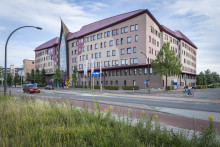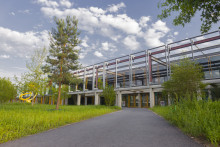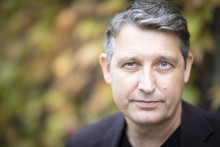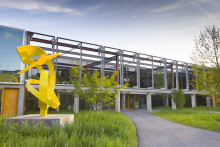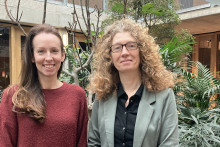Two student counselors work at ITC: Theresa van den Boogaard and her colleague Marie-Chantal Metz. 'Students can come to us for all non-academic questions and problems,’ says Van den Boogaard. 'Even at night and at weekends, because we have on-call duties. This concerns emergency cases. For example, an admission in the hospital or a death in the home country. We arrange that immediately. We ensure that the student can fly home within twelve hours and if necessary, we make an advance payment for the ticket.’
'Our guests must feel welcome'
Rector Thom Palstra thinks it is important that international students have contact with Dutch culture outside their studies and have broad social contacts, he says in a reaction. 'All our foreign students must feel welcome: within the UT, but also as a welcome guest in Dutch society.'
Low threshold
It is, among other things, this service that prevents ITC students from getting lost in their studies. The student counseling is housed close to the Course Secretariat (BOZ), student registration and the financial administration for students on the first floor of the building. 'As a result, students can easily walk in,' continues Van den Boogaard. 'They usually have a very practical question. Already being here makes it easy to talk about problems they face.’
That low threshold is a key factor, says student Thom van Harten, chairman of the ITC Student Association Board (SAB). ‘Almost all students come from far away,’ he says. 'They left home only to obtain a diploma. I think everyone experiences a culture shock in practical matters in the Netherlands. How to arrange all formalities for the study and your life in the Netherlands for instance. But also in everyday things.’
'Careful introduction period is the basis'
The student counselors agree with Van Harten. 'That is why we organize an information session immediately after arrival of the students, that makes it easy to get acclimatized in the Netherlands, Enschede and the ITC Faculty as an international community,' says Metz. ‘That session is integrated in the introduction program and we expect them to attend. During the introduction, all administrative matters that affect an international student are handled. We also provide information about healthcare in the Netherlands and the way education is organized at ITC. After the introductory period, the student is ready to fully focus on the study.’
'Home-friends'
UT spokesperson Bertyl Lankhaar says that there is a close collaboration between ITC and the Center for Educational Support (CES) on the area of (international) student counseling, where the UT uses each other's knowledge. Students said they would like to see investments in home-base projects when they were consulted for the ‘kwaliteitsafspraken’, she says. The International student barometer showed that there is room for improvement in having 'home-friends': good contacts between internationals and Dutch students.
Lankhaar: 'In these areas we developed various initiatives, such as student buddies, a more inclusive introduction program and the development of home bases, where students meet and work together.'
In this way, all the attention is given to a good start. 'We see ITC as a family,' says Van den Boogaard. ‘We look after each other. See us as guides. We do this from arrival to departure. All with one common goal: to obtain the diploma within the stipulated time.'
 The ITC family is not limited to the classroom. Practically all students live on the Boulevard in the ITC Hotel. Bianca Haverkate is resident manager there. ‘We are much more than a hotel,’ she says. ‘Here we have social control, in a good way. Our receptionist Saskia knows everyone, she immediately notices when things are not going well for someone. And Annie from housekeeping keeps an eye on things. Are you making too much of a mess? Then she says something.’
The ITC family is not limited to the classroom. Practically all students live on the Boulevard in the ITC Hotel. Bianca Haverkate is resident manager there. ‘We are much more than a hotel,’ she says. ‘Here we have social control, in a good way. Our receptionist Saskia knows everyone, she immediately notices when things are not going well for someone. And Annie from housekeeping keeps an eye on things. Are you making too much of a mess? Then she says something.’
Community feeling
Haverkate gives, not without pride, a tour of the hotel. The common areas look neat. We expect the residents to contribute to this, she adds. ‘There is just a good sense of community here. New residents are involved in the hotel life. The SAB organizes various parties and discos in the common areas. The different cultures often show something of their homeland. This creates a real community.’
According to student Thom van Harten, guidance is not an unnecessary luxury. 'All those international students have one basic principle: failure is not an option. They come to succeed. The culture is hardly student-like and we barely step out of our ITC bubble. You pay a considerable amount for the study, stay and livelihood. That comes with pressure. There is no plan B.’
‘Managing expectations is a big part of our work. It is the most important ingredient for a successful study’
To make the study a success, ITC creates a 'social circle', as Van den Boogaard calls it. 'International students need a community. They must be accompanied, especially in the first year. The combination of practical questions and the possibility for a social chat is one of the success factors. Especially international students often have barriers to come to us with a problem.’
The student counseling does not stop when the diploma is obtained. 'We always have an exit interview,' says Metz. 'What are your plans? What will you do when you get home? After two years in Twente, the student may experience a culture shock in the home country. They go through a change. Coming home can be very different from expectations and hopes. Managing these expectations is a big part of our work. It is the most important ingredient for a successful study.’


